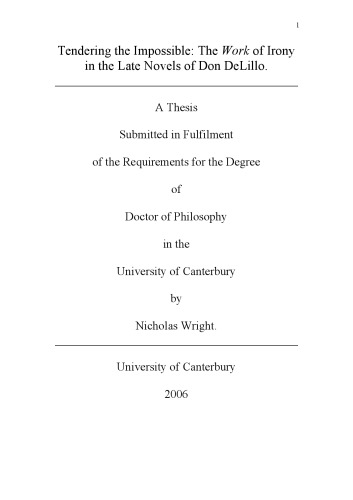

Most ebook files are in PDF format, so you can easily read them using various software such as Foxit Reader or directly on the Google Chrome browser.
Some ebook files are released by publishers in other formats such as .awz, .mobi, .epub, .fb2, etc. You may need to install specific software to read these formats on mobile/PC, such as Calibre.
Please read the tutorial at this link: https://ebookbell.com/faq
We offer FREE conversion to the popular formats you request; however, this may take some time. Therefore, right after payment, please email us, and we will try to provide the service as quickly as possible.
For some exceptional file formats or broken links (if any), please refrain from opening any disputes. Instead, email us first, and we will try to assist within a maximum of 6 hours.
EbookBell Team

0.0
0 reviews
Author: Nicholas Wright
The following thesis represents an attempt to account for the novelist Don DeLillo’s last three novels (Underworld (1999), The Body Artist (2001), and Cosmopolis (2003)) through the examination of what I conceive as DeLillo’s philosophy of language. It is my assertion that the crucial and articulating aspect of DeLillo’s philosophy of language is his investment in, and investigation of, irony. As I argue, DeLillo’s novels presume a certain conjugation of what I refer to as the work of irony (the seemingly impossible work of tendering both the allegorical imperative of naming and the ironic imperative of Otherness) with the work of art. In other words, DeLillo’s theory of language reveals his theory of art and, thus, his own theory of writing. This aesthetic philosophy becomes the critical tool with which DeLillo evaluates the various symbolic economies of a culture and its individuals caught
within late capitalism.
Chapter One: Tendering Allegory. The Ironist’s Melancholy Science
Chapter Two: The Body Artist
Chapter Three: Underworld
Chapter Four: Cosmopolis
tendering the defense
tendering the claim
tendering insurance
tendering in nfl
a tender thing
Tags: Tendering, the Impossible, The Work, Late Novels, Don DeLillo, Nicholas Wright